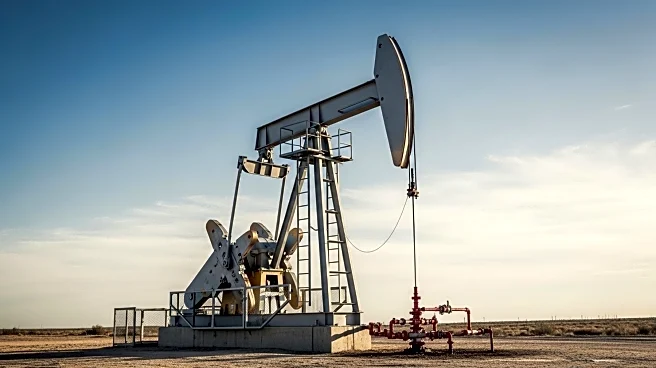What's Happening?
Texas Railroad Commission Chairman Wayne Christian has praised a report indicating a 50% reduction in methane intensity by operators in the Permian Basin since 2022. This achievement comes despite a surge in oil and natural gas production to historic levels. Christian emphasized that Texas energy producers are demonstrating that fossil fuel production can coexist with environmental progress, without federal mandates. The reduction in methane emissions is attributed to industry-driven solutions and technological innovations. The report from the Texas Methane & Flaring Coalition highlights the success of efforts to minimize flaring and improve environmental outcomes, showcasing that responsible energy development and emissions reductions are achievable.
Why It's Important?
The reduction in methane intensity is significant for both environmental and economic reasons. Methane is a potent greenhouse gas, and its reduction contributes to climate change mitigation efforts. The achievement underscores the potential for the fossil fuel industry to balance energy production with environmental stewardship. This development may influence public policy and investment decisions, as it challenges narratives that fossil fuel production is inherently detrimental to the environment. The success in Texas could serve as a model for other states and countries seeking to reduce emissions while maintaining energy security and economic growth.
What's Next?
The Texas Railroad Commission may continue to support industry-led initiatives to further reduce emissions. Stakeholders, including environmental groups and policymakers, may respond to this report by advocating for similar approaches in other regions. The ongoing dialogue between industry leaders and regulators could lead to new strategies for balancing energy production with environmental goals. Additionally, the report may influence future regulatory frameworks and investment in clean energy technologies.
Beyond the Headlines
The reduction in methane intensity highlights the role of technological innovation in addressing environmental challenges. It raises questions about the balance between voluntary industry actions and regulatory mandates. The success in Texas may prompt discussions on the ethical responsibilities of energy producers in mitigating environmental impacts. Long-term, this development could shift perceptions of the fossil fuel industry and its role in a sustainable energy future.










